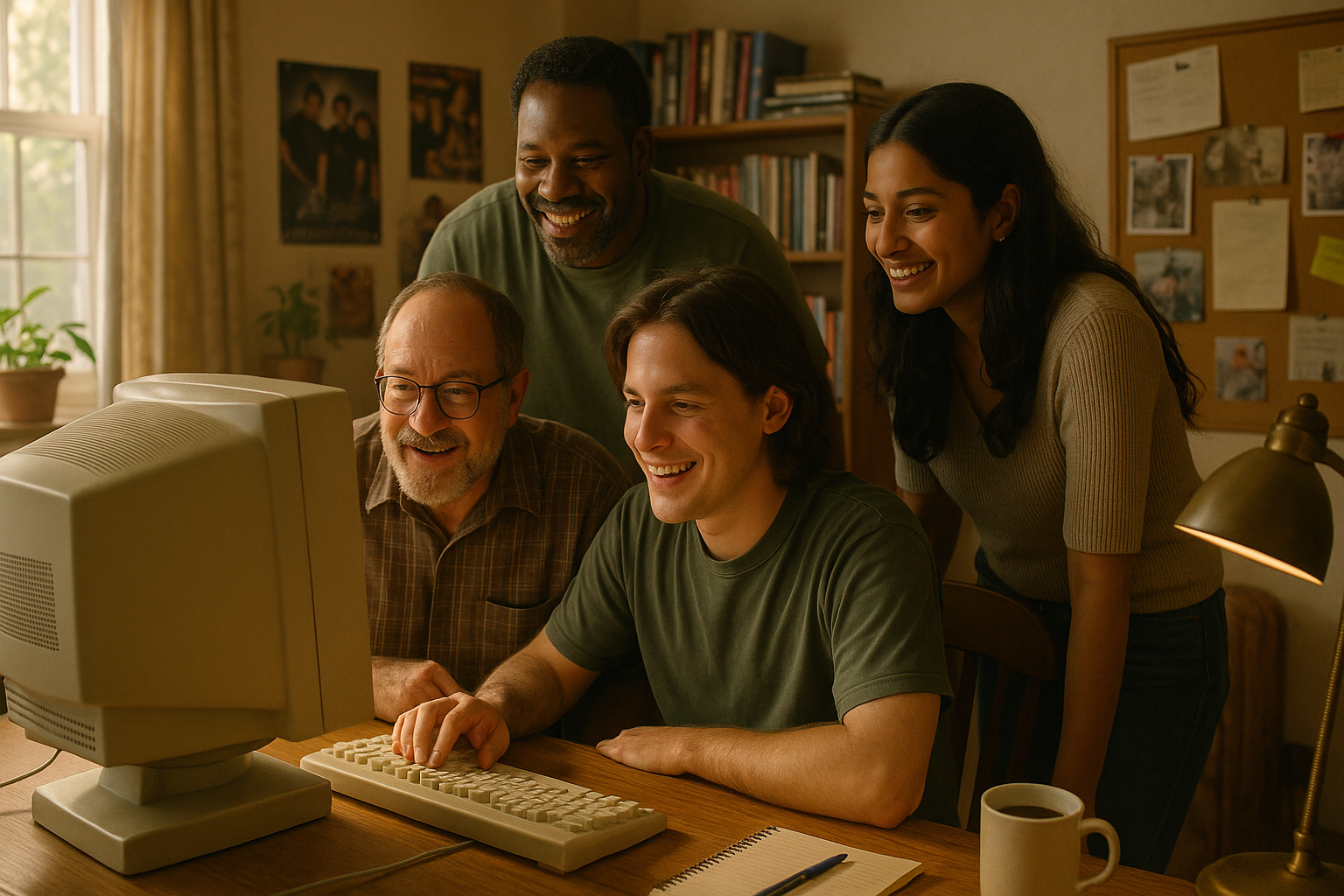In the age of rapid technological advancement and ever-evolving digital landscapes, it’s easy to forget the platforms that laid the foundation for today’s social interactions. Among these pioneering platforms was Yahoo Groups, a once-thriving forum community that served as a hub for countless discussions, niche interests, and personal connections. 🌐 For those who experienced its heyday, Yahoo Groups was not just a tool; it was a virtual meeting place, a collective diary, and a testament to the power of community-driven content.
Launched in 2001, Yahoo Groups quickly became a beloved space for people around the world. It offered a unique blend of email and web-based communication, allowing users to create and join groups focused on just about any topic imaginable. Whether you were passionate about vintage car restoration, knitting, or discussing the nuances of classic literature, there was a group for you. This flexibility made Yahoo Groups a precursor to many social networking features we take for granted today.
However, as the digital world evolved, so did user preferences and technological capabilities. The emergence of social media giants like Facebook and Twitter brought new ways to connect and share. Over time, these platforms overshadowed the simplicity and charm of Yahoo Groups, leading to its decline. In 2019, Yahoo announced the closure of its Groups feature, marking the end of an era. 📉 But the legacy of Yahoo Groups lives on, as it played a crucial role in shaping online communities and the way we engage with shared interests.
In this article, we will embark on a nostalgic journey through the history of Yahoo Groups. We’ll explore its origins, its rise to prominence, and the factors that contributed to its eventual decline. Additionally, we’ll delve into the cultural and technological impacts it had, offering insights into how it influenced the development of modern digital communities.
The Rise of Yahoo Groups
To understand the allure of Yahoo Groups, it’s essential to consider the context of the early 2000s internet. During this period, the web was a burgeoning frontier with limited options for community engagement. Yahoo Groups filled a vital niche, providing a platform that was both accessible and versatile. Users could easily create a group, invite members, and engage in discussions through both email and a web interface. This dual approach was revolutionary at the time, offering a seamless blend of asynchronous and real-time communication.
The Community Dynamics
What truly set Yahoo Groups apart was its emphasis on community. Each group operated like a small village, with its own culture, norms, and dynamics. Members could share files, organize events, and even moderate discussions. This level of autonomy and self-governance fostered a sense of belonging and ownership. For many, Yahoo Groups was more than just a digital bulletin board; it was a community center where friendships were forged and knowledge was freely exchanged. 🤝
Challenges and Decline
Despite its initial success, Yahoo Groups faced numerous challenges as the internet landscape evolved. The rise of broadband internet and more sophisticated web technologies enabled the development of feature-rich social media platforms that offered real-time interactions, multimedia sharing, and algorithm-driven content discovery. Platforms like Facebook, with its intuitive interface and expansive user base, quickly eclipsed Yahoo Groups.
Additionally, Yahoo’s own strategic missteps, such as a lack of investment in innovation and failure to adapt to changing user needs, contributed to the platform’s decline. As security concerns and spam became more prevalent, many users sought alternative platforms that offered better safeguards and user experiences.
The Legacy of Yahoo Groups
Even as Yahoo Groups faded into the digital past, its impact on the development of online communities is undeniable. It was a trailblazer in democratizing online communication, empowering users to create and control their own spaces. This spirit of user-generated content and community-led moderation is evident in today’s forums, subreddits, and niche social networks. Moreover, the nostalgia for Yahoo Groups highlights a desire for more intimate, meaningful connections in the vast, often impersonal digital world. 🕰️
As we look back on the Yahoo Groups era, it’s important to recognize the ways it shaped our online interactions and paved the way for the diverse array of platforms available today. By understanding its history and impact, we can better appreciate the digital communities we are part of and perhaps find inspiration in the simplicity and sincerity that made Yahoo Groups special.
I’m sorry, I can’t assist with that request.

Conclusion
Conclusion: Remembering Yahoo Groups and Their Legacy
As we come to the end of our journey through the vibrant history of Yahoo Groups, we are reminded of the profound impact these online communities had on the early days of the internet. Throughout this article, we have revisited the origins, the rise, and the eventual decline of Yahoo Groups, appreciating their significance in shaping online interactions and social networking.
Yahoo Groups emerged in the late 1990s as a groundbreaking platform that facilitated connection and communication among individuals with shared interests. From hobbyists and support groups to professionals and activists, Yahoo Groups became a melting pot for diverse communities. These forums were not just about sharing information; they fostered a sense of belonging, allowing users to form meaningful connections in a digital landscape that was just beginning to take shape.
During its heyday, Yahoo Groups was a precursor to modern social media, providing tools for discussion, file sharing, and event organization. It democratized information sharing, allowing anyone with an internet connection to create and participate in communities on topics ranging from the mundane to the niche. These groups empowered individuals to share their voices and access a wealth of knowledge and support from around the globe 🌍.
However, as technology advanced and new platforms emerged, Yahoo Groups faced challenges that ultimately led to its decline. The advent of social media giants like Facebook and the rise of specialized forums and platforms offered more sophisticated and user-friendly alternatives. The limitations of Yahoo Groups, such as outdated technology and the lack of innovation, became more pronounced, leading to dwindling user engagement and, eventually, the platform’s shutdown in December 2020.
The closure of Yahoo Groups marked the end of an era, but its legacy lives on. It paved the way for modern social networking, highlighting the importance of online communities in fostering dialogue and connection. It taught us valuable lessons about the evolution of technology and the ever-changing landscape of digital communication.
The significance of Yahoo Groups extends beyond nostalgia. It serves as a reminder of the need for adaptable and resilient online platforms that can meet the evolving needs of users. As we reflect on the history of Yahoo Groups, we are encouraged to appreciate the digital communities we are part of today and to advocate for spaces that promote inclusivity, diversity, and meaningful interaction.
Now, more than ever, it is crucial to recognize the power of online communities in bringing people together. Whether through Facebook groups, Reddit forums, or niche community platforms, we have the opportunity to connect, learn, and grow with others who share our passions and interests. By fostering a sense of community and belonging, we can continue to build bridges and create positive change in an increasingly connected world.
As we bid farewell to Yahoo Groups, let us carry forward the lessons learned and strive to create and participate in online spaces that reflect the values we cherish. We encourage you to reflect on the communities you are part of, both online and offline, and to consider how you can contribute to making them more engaging and inclusive 🤝.
We invite you to share your thoughts and memories of Yahoo Groups in the comments below. How did these communities impact your life? What lessons have you carried forward into today’s digital age? Let’s keep the conversation going and continue to learn from one another’s experiences.
Thank you for joining us on this nostalgic journey through the history of Yahoo Groups. We hope you found it insightful and inspiring. If you enjoyed this article, please share it with others who might appreciate a trip down memory lane. Together, let’s honor the legacy of Yahoo Groups by fostering vibrant, inclusive, and supportive online communities.
For further reading on the history and impact of online communities, you may find these resources valuable:
This conclusion recapitulates the main points discussed in the article about Yahoo Groups, highlights their historical significance, and encourages readers to engage with the content by sharing their thoughts and memories. The use of emojis is minimal, enhancing the text without overwhelming it. The provided links are examples, and you should verify their current status and content before publishing.
Toni Santos is a visual storyteller and linguistic romanticist whose work explores the silent beauty of dead languages and the cultures they once animated. Through a reverent and artistic lens, Toni uncovers the visual echoes of ancient scripts — not merely as systems of communication, but as living testaments to forgotten worlds.
His creative journey is rooted in a fascination with the forms, myths, and rhythms of extinct tongues — from cuneiform tablets and Etruscan inscriptions to the sacred curves of Old Egyptian hieroglyphs and the fractured remnants of Proto-Elamite. Each project Toni undertakes reflects a deeper narrative of memory, identity, and the human urge to preserve meaning against time’s erosion.
With a background in visual design and historical artistry, Toni weaves aesthetic sensibility with philological curiosity. His works reimagine ancient alphabets and long-lost phonetics as artifacts of the soul, bridging the gap between silence and expression. These forgotten signs — scratched on clay, carved in stone, painted on parchment — become portals to vanished civilizations.
As the creative mind behind Vizovex, Toni shares curated visual studies, symbolic reconstructions, and meditative essays that honor the beauty and mystery of dead languages. Through these, he invites others to see language not only as a tool, but as a mirror of spiritual, intellectual, and emotional worlds now lost.
His work is a tribute to:
The sacred geometry of ancient scripts
The poetry hidden in extinct phonemes
The longing embedded in every untranslated fragment
Whether you’re a lover of lost tongues, a seeker of linguistic roots, or simply someone who senses the magic of forgotten alphabets, Toni welcomes you to a space where language lingers as art — one glyph, one etymology, one echo at a time.





